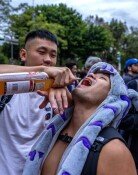Awake, people of the Republic of Korea!
Awake, people of the Republic of Korea!
Posted December. 31, 2011 04:44,
Show your tenacity. Try to rock the Earth. Every can see you. History will be rewritten.
This is part of the lyrics of The Boys by the K-pop band Girls` Generation. Originating from South Korea, K-pop has swept Southeast Asia, the Middle East, Europe, the U.S., Latin America, and even Africa. Youths around the world are enthusiastic about South Korean songs and dances, which are arguably the manifestation of the potential of the South Korean people. When Western pop music, which first spread through the U.S. military garrison in Seouls Yongsan district, dominated pop culture in South Korea, nobody could imagine that this day would come. South Korean youths, however, have achieved this by leading the way in taking on challenges. South Koreans can take pride in themselves.
If the people have broad and forward-looking perspectives and jointly bring about prosperity to the country instead of waging internal conflict, they can achieve much bigger things. Advanced economies are reeling from domestic political instability and the global economic downturn. Against this backdrop, the New Year can be the first year for South Korea to emerge as a leader in the international community in the Age of Asia that will arrive along with the decline of the West.
South Koreans will ring in the New Year with a determined resolution as if setting sail in a troubled sea. Every year has been fraught with difficulty, but South Koreans will face particularly formidable challenges this year given the situations at home and abroad. On the global economic outlook for this year, the British weekly Economist said people will often have jitters as if the end of the world is imminent.
Tension on the Korean Peninsula this year will further be heightened due to the sudden death of North Korean leader Kim Jong Il and his son Kim Jong Uns hereditary power succession. Another shock can come from North Korea at any time. The success of the power transfer by Kim Jong Un, who is not yet 30, is uncertain, and Pyongyang has yet to renounce its nuclear ambition. China will get a new leadership and the U.S. will hold a presidential election this year. Due to domestic politics, Washington will probably pay less attention to Pyongyang or want the stability of the Stalinist country. Beijing, which has acted as Pyongyangs guardian, will further strengthen its influence over its ally and throw its weight behind Kim Jong Un. Washington also wants to prevent Pyongyangs nuclear provocations through the early establishment of the Kim Jong Un regime. Such approaches by Beijing and Washington will not guarantee peace on the Korean Peninsula, however. If the Lee Myung-bak administration in Seoul also wants a soft landing of the new North Korean government, 2.4 million North Koreans, who must have seen a ray of hope after hearing of Kim Jong Ils death, will fall into despair.
The death of Kim Jong Il, who ruled the North with an iron fist for 37 years and orchestrated attacks on the South Korean naval vessel Cheonan and Yeonpyeong Island, should serve as an opportunity to bring about positive change to the peninsula. By cooperating with Washington and Beijing, Seoul should urge Pyongyang to reform and open its country and step up diplomatic efforts to remove the Norths nuclear threat. Helping advance the day when North Koreans can live as human beings is realizing universal values, fulfilling a national duty, and opening the path to peaceful unification of the two Koreas.
The Norths powerful National Defense Commission has threatened Seoul Friday, saying, We will not deal with the traitor Lee Myung-bak government, which has persisted to ban South Koreans from offering their condolences (to Kim Jong Il) and sending mourning delegations to Pyongyang, adding, We will never fail to mete out punishment to the traitor group. The Norths highest military organ also signaled no change even after Kim Jong Ils death by saying, Expect no change from us. The prospects of Pyongyang launching provocations against Seoul to solidify the leadership of Kim Jong Un and bolster internal unity remain. In this sense, South Koreas top priority is strengthening its national security posture. A strong defense can attract both foreign and domestic investment. To prevent the scheduled transfer of wartime operational command in December 2015 from Washington to Seoul from generating fears over a national security breach, South Korea must establish the basis for genuine defense reform this year.
As seen last year, all of the worlds countries face political and economic difficulty. With polarization intensifying due to globalization and technological development, politics is being punished by the economy. Political populism that brought about excessive welfare has resulted in fiscal crises and sovereign bankruptcies in Portugal, Ireland, Italy, Greece and Spain. This is because people in those countries preferred populist politics and enjoyed reckless welfare policies. Incompetent and corrupt governments were also punished last year.
This year will see a Big Bang in the global political scene. Fifty-nine countries including South Korea, the U.S., China, Russia and France will hold presidential elections. The successor to President Lee Myung-bak must have the ability to lead the way in bringing peace to Northeast Asia and achieving Korean reunification by cooperating with new leaders in the U.S., China, and Russia. How Kim Jong Un, the third-generation hereditary successor of the Kim Il Sung dynasty of North Korea, will affect the five-year term of South Koreas new president is uncertain. The next several years will likely be a watershed for the two Koreas. The key significance of this years presidential election in Seoul is electing a national leader who can rise to the challenge in cooperation with the 50 million South Koreans in a wise and bold fashion. An awakened people can develop a country.
Parliamentary and presidential elections in South Korea this year can generate social unrest down the road by stoking regional, class, generational and ideological conflicts. In this regard, South Koreans should be wise in electing lawmakers who will run parliament for the next four years and politicians and political parties who will lead the government for the next five years. The people must not again regret and deplore their choices one or two years after the parliamentary and presidential elections. To prevent this, they should not be deceived by hollow pledges, sweet talk and populist welfare policies that will eventually undermine the basis of the national economy. Politicians who ask to share the pain for economic development can enhance welfare without making a dent in the countrys fiscal health. South Koreans now enjoy the fruits of their parents sweat shed in a free democracy and market economy system. Sticking to short-term gains such as free welfare will compromise the future of the countrys children.
The general and presidential elections should not make the Lee Myung-bak administration sit on its hands. Economic think tanks forecast that economic growth will remain at the 3-percent level this year. The eurozone debt crisis will show no signs of ending and the U.S. can remain lackluster over the long term. Efforts to strengthen economic fundamentals are needed that much more if external conditions prove unfavorable. Seoul should turn its free trade agreement with Washington, which takes effect in 2012, into an opportunity to boost productivity and economic growth. To fully utilize the effects of the accord, deregulation in the medical, education, tourist and childcare industries is required. Reform to provide quality education and vocational training is also needed.
The market economy is the most successful system in human history. Capitalism remains strong due to its flexibility that has allowed adaptation to the changing times. For the survival of the market economy, coexistence capitalism should be pursued. Winners of the market should take the lead in practicing noblesse oblige instead of monopolizing profits. A market economy asks for fairer and more efficient reform in national finance, corporate governance, taxation, the financial sector and job creation.
Job creation is the best way to resolve wealth polarization. South Korea should promote the high value-added service industry and high-tech manufacturing that cannot be replaced by computers or machines or by the 1.4 billion people in China. Regulations that hinder the development of the service industry should be removed and the quality of education should be significantly enhanced so that unemployed youths can land quality jobs. President Lee should not be swayed by elections but should instead devote himself to bringing about sustainable national growth.







